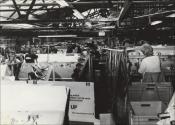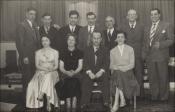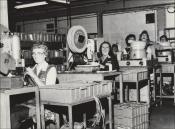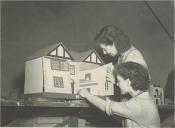Browse the interviews
Sorted by interview reference
VSW021 Maureen Jones, ROF Pembrey, Carmarthenshire
Maureen left grammar school at 15½ (c. 1948) and started work as a learner tracer in ROPF Pen-bre, in an office full of men. (1950-54). Her job was to trace over the men’s drawings in ink. There was Social Club there and she played badminton for the factory. She learned to smoke from the girls there. There were apprentices in the office and she learned to dance with them. There weren’t any opportunities for girls to be apprentices. Then she worked in the office at Cynheidre, had a child and went to Thyssen’s (1973-93) making drawings as well as tracing them Some of the men had dangerous jobs in Pembrey – there were strict rules about matches and cigarettes. The men in the office talked about rugby a lot.VN022 Megan Owen, James Kaylor Compacts, Caernarfon
Megan worked for twenty years in the compact factory, starting at age 15. She hadn't left school properly when she started, but a friend who'd passed a scholarship to go to grammar school didn't want to go and this friend told Megan they were looking for people in the compact factory. So the two went down, got a job, and Megan had a row off her mother afterwards. She said on the first day they went in like schoolgirls, with little white socks and pony tails, giggling and not knowing what to do. The younger girls were put together in a room and taught how to put the little round piece that held the powder into the compacts and then the satin around it. Later she was moved onto to do other jobs, like printing, putting the designs onto the compacts with paint. Megan left for 12 years to raise her daughter, and then returned to the factory and stayed until it closed , c 1984.Part of this interview is available as an audio file




VSE022 Margaret Anne Amblin (nee Williams), Thorns, Merthyr;Kayser Bondor, Merthyr
Anne left school at 16 (1957) and went straight to Kayser Bondor – making lingerie. Training school there – operate machines and clean them. Pretty place to work. Own machine – opened bundle and took ticket off, sewed and when finished tied bundle. Piecework. Worked there until she had her first son 1966. Went back part-time later. . M&S very fussy about quality. Very clean. Manikin parades by workers – of underwear. Buying clothes on the card in Merthyr’s shops. Supervisors and managers watching them. Singing – rock and roll and jiving. One male machinist – teased. Social life – dancing. She talks of new domestic amenities. Her uncle wouldn’t allow his wife to used her new Hoover washing machine unless he was there. Interfactory events in Merthyr. First trip abroad with friends to Italy c. 1958-9. During training taken out to do keep fit exercises. Factory moved to Dowlais. Finished working there in c. 1968/9. When children older she went to Thorn’s – evening shift, making light bulbs. Loading bulbs into holes in conveyor belt. Also then worked for this factory - part-time day shift.VSW022 Anonymous, Slimma-Dewhirst, Goodwick
The speaker left school at 16 (1978) and started in Slimma’s – the manager had visited her school and offered her a sewing job. She started on bar-tacking, progressed to turning garments and then the loop machine. It was difficult. The factory was noisy and hot. Discounts in factory shop c. 50% for trousers, cardigans and shoes. Help with reaching targets. Lack of sympathy when she needed leave. She felt proud she made clothes for M&S. She lost a nail in a machine – compensation. Health and Safety – no bags on the floor, no coats on the back of chairs. Not allowed to talk – it would affect targets. She was given a mask because of the dust. Blowing and polishing her machine. Made redundant when factory closed – 2002 – this was a shock and she hasn’t worked since. She received a watch for 20 years’ service.VN023 Kathy Smith, Hotpoint, Llandudno
Kathy worked in the personnel dept. at Hotpoint from its beginnings in 1947 and, apart from a 15 year break when she looked after her family or worked on ships, including the Queen Elizabeth, she stayed until her voluntary redundancy in 1991, at the age of 62. She enjoyed working in the factory, knew everyone, and describes it as almost a family. She says it was a 'tremendous' place to work, although she admits she didn't have the monotony of the assembly line. In her job, there was something different every day and it was exciting. She never knew what she would be faced with next as people used to come to her with all sorts of problems. She did a variety of tasks under the role of personnel officer, including some time on the assembly line to try and understand how the workers could do such a repetive job day in day out.


VSE023 Frances Francis, JR Freeman's Cigar Factory, Cardiff
Frances’ mother worked in the old cigar factory in North Clive Street – making them by hand. After leaving school at c.15 Frances worked in shops and then went to the new Freeman’s Factory – making them on machines. The smell there was sickly. When she was in training she broke the press – they put it in a glass case. A modern factory. The valley girls wore curlers – they hid cigars in the curlers! – spot checks. Toilet break timed. Horrendous noise of cutting cigars. Later worked in shop for 30 years. Piecework. Her factory number was 344. She has all her payslips. Knows of Miss Manikin competition. Her parents were poor - the story of the shoes. They could order cigarettes and cigars once a month e.g. 4 oz of Old Holborn. Frances never smoked.VSW023 Caroline Bowen, Slimma-Dewhirst, Goodwick
Caroline left school at 15 (1983) and worked in several places – gardening, hotel management and on the ferry before replying to a Slimma advertisement (c.1993) . She felt the women were bitchy and the factory environment cliquey. She worked on jeans but had difficulty keeping up with her quota. She was reprimanded. She provided her own expensive scissors c. £12 every 4 weeks. Her hands became sore- everyone strapped their hands. Moved to make boxer shorts. She fell in the factory and lost her job. She returned to work in the canteen. Headaches and chest complaints on the factory floor. She hated the work. She was at the bottom re status there. Baby showers and ribbons to mark time. Box of chocolates at Xmas time. Too hot or too cold. Radio 2 and sing alongs. Three week annual leave. Hampers brought in for Xmas celebrations. She suffered miscarriages – the effect of strain and stress in the factory? It was ‘hell’ there.VN024 Margaret Jones, B.S.Bacon toy factory, Llanrwst
Margaret's first job was in the kitchen in the school canteen, washing up and helping with the dinners, for which she thinks she earned the equivalent of 50p. She was there for about two years. She went to the toy factory in 1948 after going down to the factory in person to ask for job. She must have had an interview but can't remember. She was happy to have a job because you had to have a job in those days, she said. She thinks she worked from 8am to 5pm, but didn't have to work weekends. They had breaks but there was no canteen. The workers went to MacLean's Cafe in a street nearby where they bought their teas and coffees and something to eat. She worked in the toy factory for ten years between 1948-1958. She says it was a friendly place to work and she built the dolls houses the whole time she was there. There was no messing about, you had to concentrate on the job, she said. The owner, Mr Bacon, was always there, in and out of the office. In the end, she left for a job that offered better wages.
